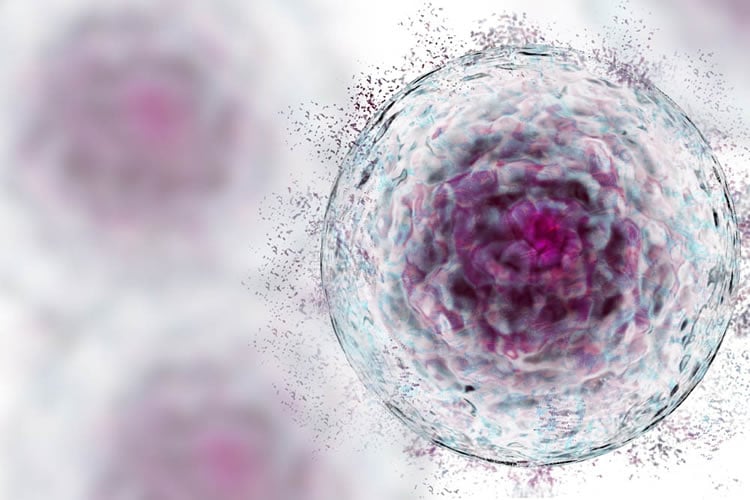Summary: The insulin-like growth factor II gene plays a critical role in adult stem cell maintenance of both the intestine and the brain. Findings suggest IGF-2 is essential for multiple stem cell types, including those implicated in cognitive function and renewing the lining of the small intestine.
Source: Rutgers University
The organs in our bodies house stem cells that are necessary to regenerate cells when they become damaged, diseased or too old to function. Researchers at Rutgers University have identified a new factor that is essential for maintaining the stem cells in the brain and gut and whose loss may contribute to anxiety and cognitive disorders and to gastrointestinal diseases.
The study, published in the journal Stem Cell Reports, reveals the importance of the insulin-like growth factor II gene in adult stem cell maintenance in these two organs. The gene provides key support for the existence of two, functionally distinct sets of stem cells in the intestine, whose unregulated self-renewal and proliferation may contribute to colorectal cancers.
“The role that the insulin-like growth factor II gene plays in adult stem cells has been largely unknown. This growth factor was previously regarded as dispensable in adults,” said co-author Steven Levison, director of the Laboratory for Regenerative Neurobiology at Rutgers New Jersey Medical School. “The discovery that there is a factor — this gene product — that is common between more than one adult stem cell population is remarkable.”
The findings indicate that this growth factor is essential for multiple types of adult stem cells, including those critical for cognitive function, sense of smell and for renewing the lining of the small intestine in adults.
In the study, the researchers removed the gene from adult mice either rapidly over five days or more slowly over 15 days. In the intestine, the fast deletion of the gene led to a rapid loss of fast-cycling stem cells that replenish the gut lining, leading to dramatic weight loss and death within a week. A slower deletion of the gene allowed the mice to survive due to the recruitment of a second, and more inactive, population of gut stem cells, whose existence has been debated. Additionally, the study revealed that half of the stem cells in two regions of the brain that house neural stem cells were lost, causing deficits in learning and memory, increased anxiety and a loss of the sense of smell.

“When the gene was removed acutely, the stem cells in glands in the inner surface of the small intestine could not continue their normal cycle of continued cell replacement, causing organ failure,” said co-author Teresa Wood, a professor at Rutgers New Jersey Medical School. “However, when the gene was deleted slowly, it gave the other stem cells an opportunity to take over for the lost stem cells.”
Other Rutgers co-authors were Qiang Feng, Shravanthi Chidambaram, Jaimie M. Testai, Ekta Kumari, Deborah E. Rothbard, Tara Cominski, Kevin Pang and Nan Gao. The intestinal studies were performed in Gao’s lab at Rutgers University-Newark.
Source:
Rutgers University
Media Contacts:
Patti Verbanas – Rutgers University
Image Source:
The image is adapted from the Rutgers University news release.
Original Research: Closed access
“Insulin-like Growth Factor II: An Essential Adult Stem Cell Niche Constituent in Brain and Intestine”
Levison et al. Stem Cell Reports. Published online April 15, 2019 doi:10.1016/j.stemcr.2019.02.011
Abstract
Insulin-like Growth Factor II: An Essential Adult Stem Cell Niche Constituent in Brain and Intestine
Highlights
• IGF-II maintains neural stem cells in the subventricular and subgranular zones
• Adult loss of IGF-II increases new neurons and causes behavioral deficits
• IGF-II is produced locally within the adult intestinal stem cell niche
• Induced Igf2 deletion causes rapid intestinal stem cell loss
Summary
Tissue-specific stem cells have unique properties and growth requirements, but a small set of juxtacrine and paracrine signals have been identified that are required across multiple niches. Whereas insulin-like growth factor II (IGF-II) is necessary for prenatal growth, its role in adult stem cell physiology is largely unknown. We show that loss of Igf2 in adult mice resulted in a ∼50% reduction in slowly dividing, label-retaining cells in the two regions of the brain that harbor neural stem cells. Concordantly, induced Igf2 deletion increased newly generated neurons in the olfactory bulb accompanied by hyposmia, and caused impairments in learning and memory and increased anxiety. Induced Igf2 deletion also resulted in rapid loss of stem and progenitor cells in the crypts of Lieberkühn, leading to body-weight loss and lethality and the inability to produce organoids in vitro. These data demonstrate that IGF-II is critical for multiple adult stem cell niches.







